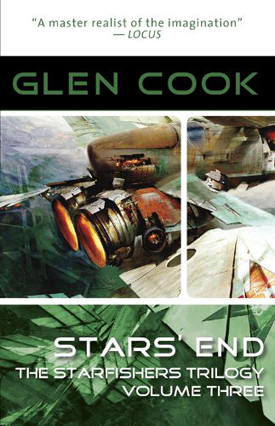 Glen Cook brings his Starfishers Trilogy to a close with Stars’ End, tying up all the loose ends involving Masato Igarashi Storm, Moyshe benRabi, the Confederation Navy, the Sangaree, and the High Seiners, the Starfishers. Well, pretty much.
Glen Cook brings his Starfishers Trilogy to a close with Stars’ End, tying up all the loose ends involving Masato Igarashi Storm, Moyshe benRabi, the Confederation Navy, the Sangaree, and the High Seiners, the Starfishers. Well, pretty much.
This being a continuation, there’s not much to be said about the story line — except, of course, for the wild cards that Cook has thrown in to liven things up a bit, such as the alien menace moving out from the galaxy’s center and carefully eradicating every trace of sentient life in its path — and then abandoning the planets thus cleaned up and moving on. Or a nova bomb that actually does cause stars to nova, just waiting for a set of coordinates to solve the Sangaree problem once and for all — unless, of course, one of the mad scientists involved in its creation actually does go mad and make the whole thing moot.
This within the overall story of the Starfishers’ bid to open up Star’s End, the great alien fortress that is bristling with weaponry that has so far proved unbeatable. Needless to say, the Confederation Navy has its own plan, made more urgent by the discovery of the aliens. A great deal hinges on Mouse and benRabi, complicated by benRabi’s divided loyalties and even further complicated by the unraveling of his various personality transplants at inopportune times.
In other words, it’s your typical Glen Cook story.
It’s deceptive. On first reading, I came away thinking it flawed: There’s a major climax — a real story-finisher — with over a hundred pages left to go, and while there are other climaxes as we progress, they aren’t up to that level. We continue reading, because Cook’s writing commands that kind of attention, but it never quite hits that kind of peak again. On rereading, I realized there’s another level of activity going on here, one that hinges on BenRabi’s history and the way it overtakes him in the final part of this installment, as the layers of personality fragment and peel away and he becomes, once again, Thomas McLennon. It’s a different kind of tension, and it threw me the first time through. One has to keep in mind that this is BenRabi’s story.
Years ago, when I first read this trilogy, I remember coming away with the feeling that Shadowline was the high point, and that Starfishers and Stars’ End, while certainly viable stories, missed that kind of resonance. I suspect, from this vantage, that the deceptive ending in the final volume is a big part of the reason for that reaction. (There’s also the fact that the Norse gods are running around loose in the first volume, but still. . . .) That’s not something we’re used to with Cook.
And that’s the end of Mouse’s story — and BenRabi’s — but there’s more going on in this universe. . . .
(Night Shade Books, 2010 [orig. 1982])
